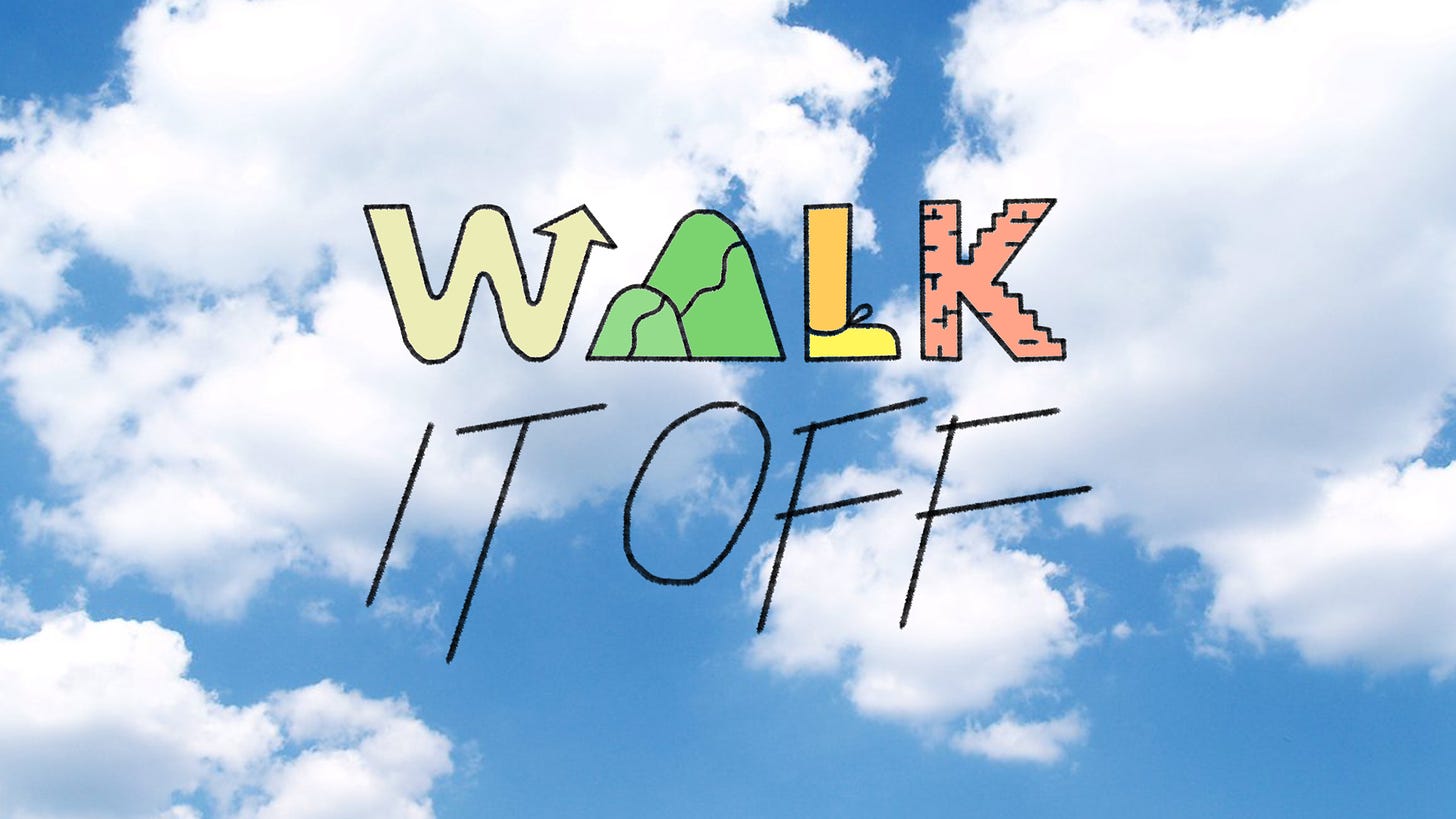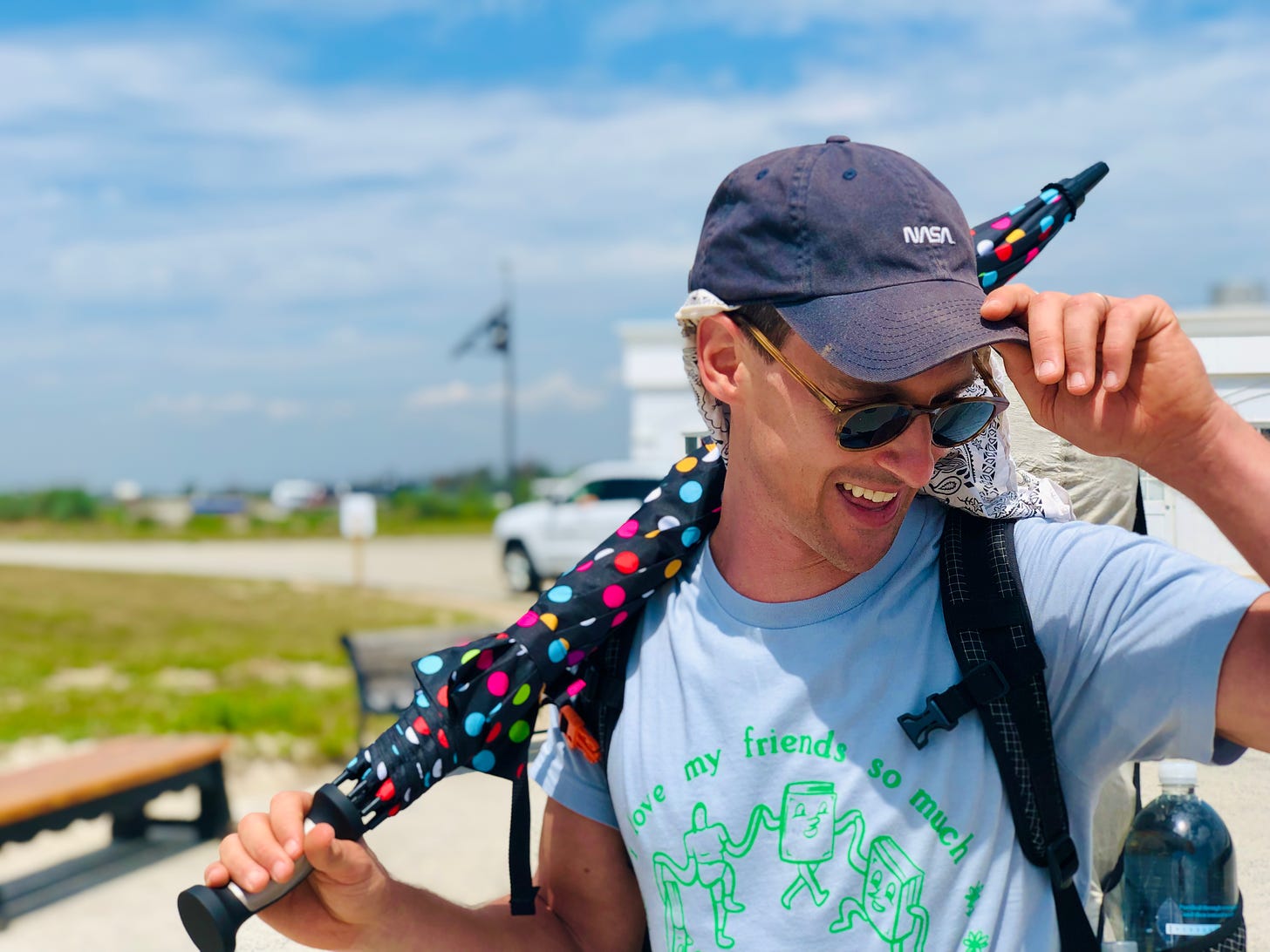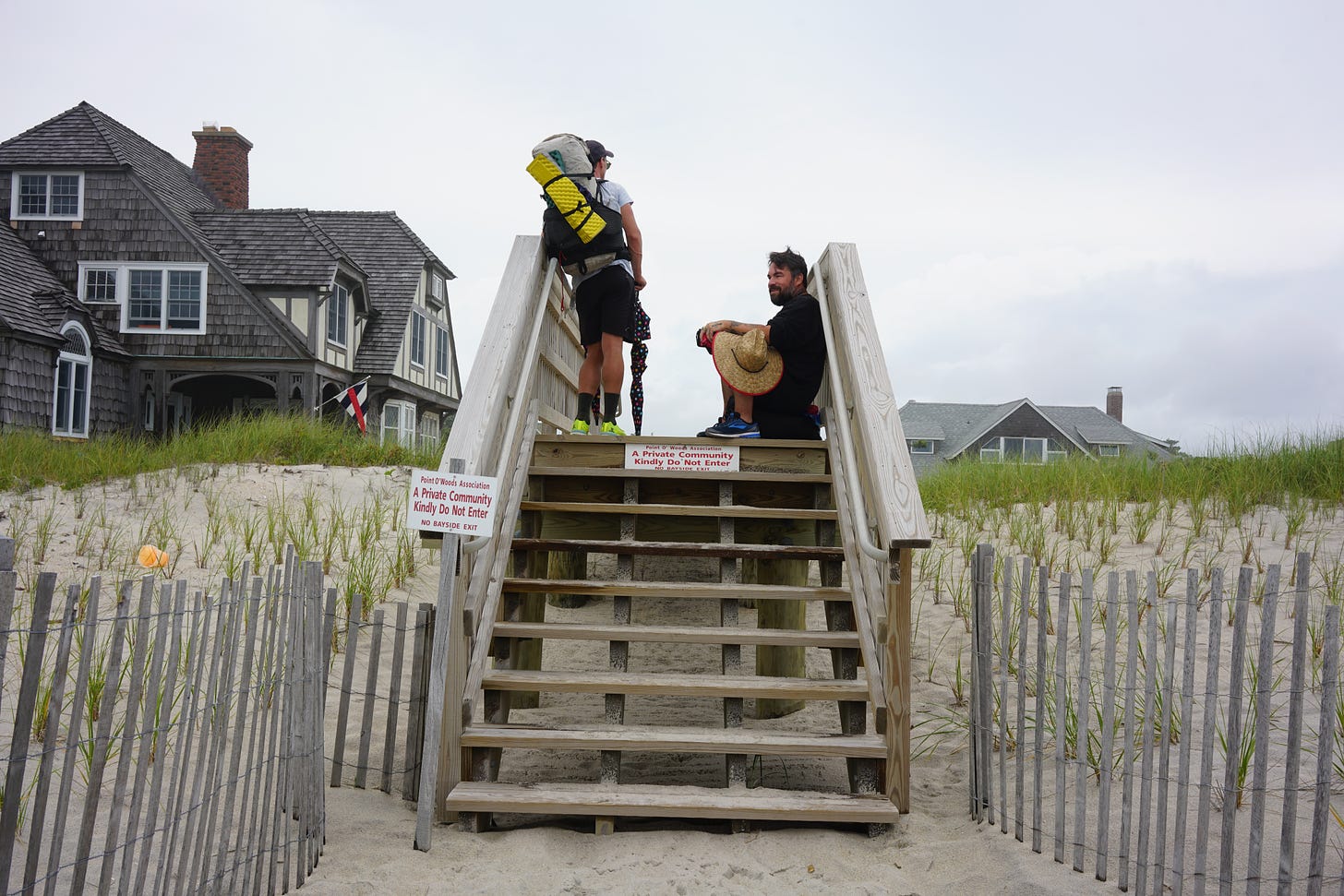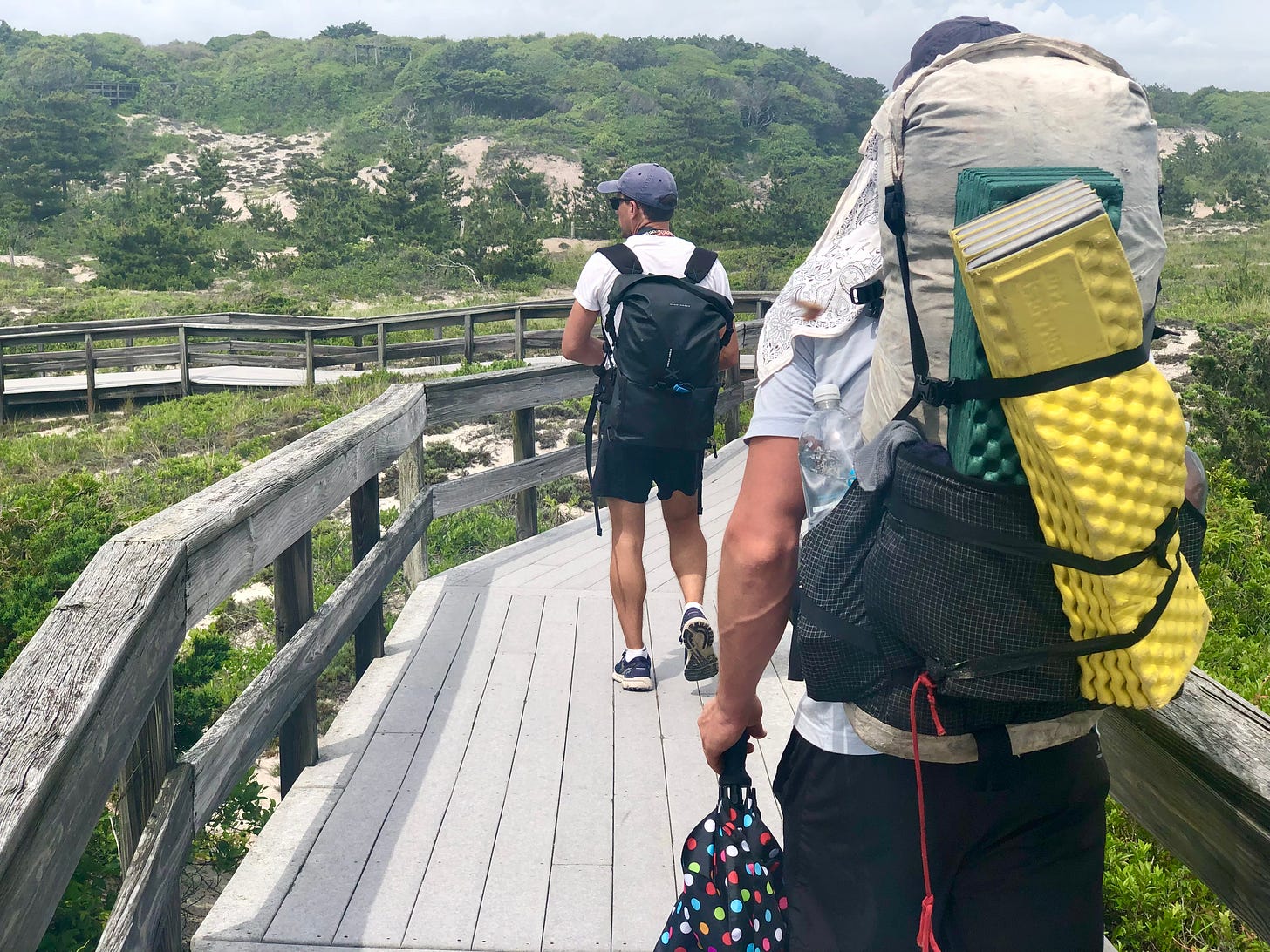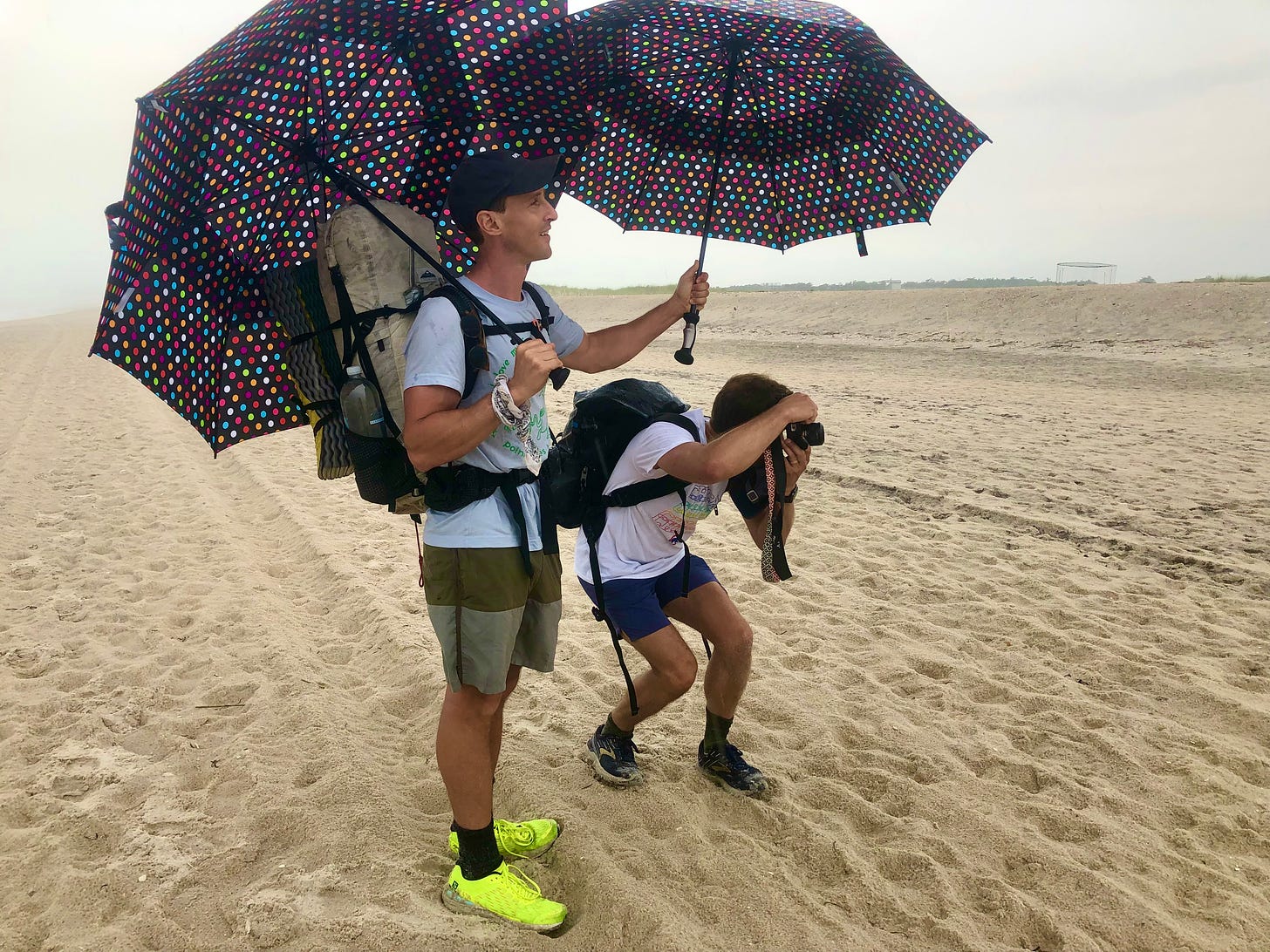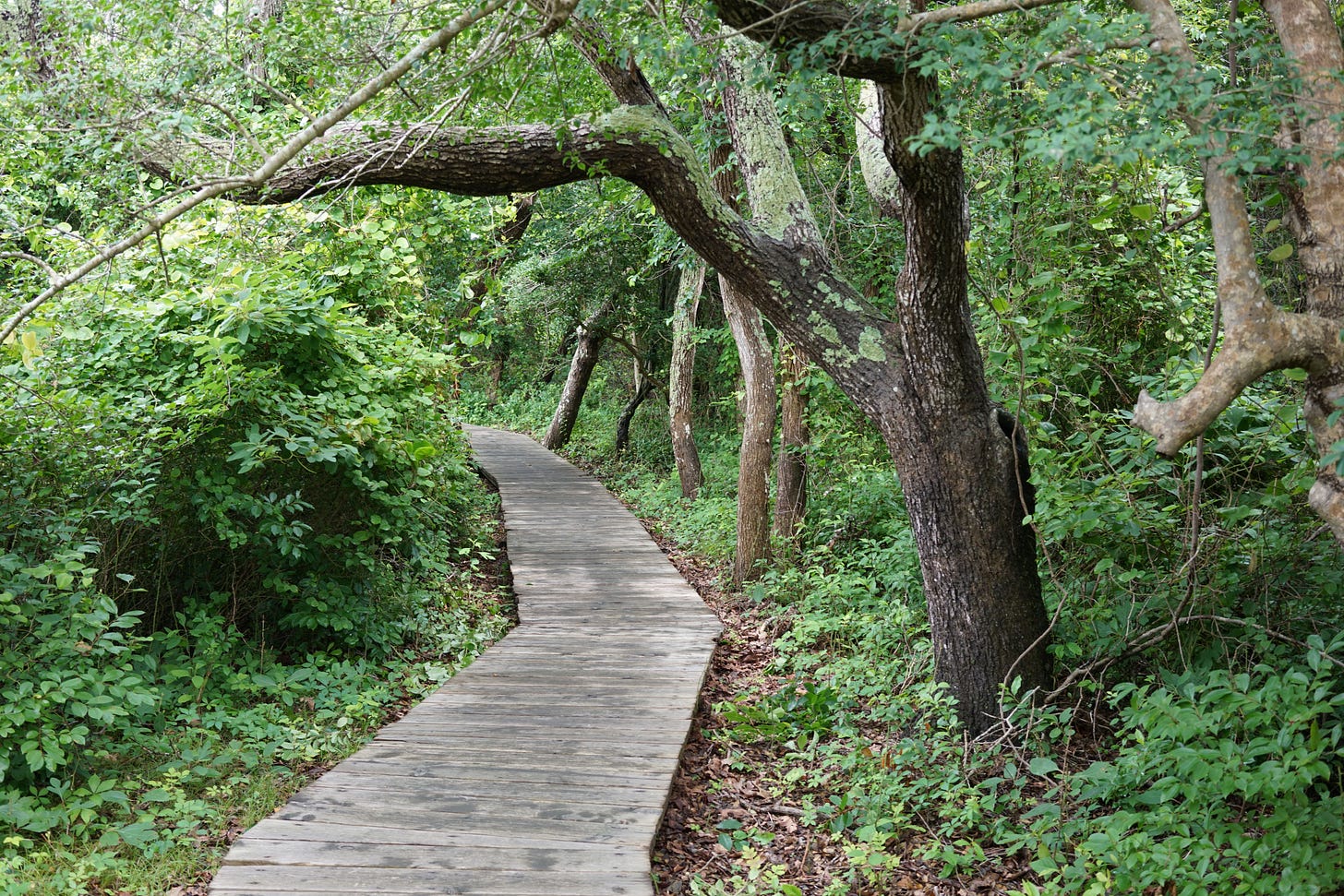A Long Walk on Fire Island with Robert Moor
"I believe that remaining in a state of comfort—all of the time—is a subtle form of torture."
“You boys know about Fire Island, right?”
Robert Moor, his husband Remi Morawski, and myself are in the back of an Uber crossing the Fire Island Inlet Bridge on the Robert Moses Causeway. We all look at each other for a moment, before I let out a quick, “Yeah, man. All good,” and do my best to move our conversation with the driver on to other topics.
Later, when we are walking, we’ll come back to that moment over and over again. Perhaps we had been too assumptive. Maybe the man was going to warn us about ghosts, or tell us a mystery of the island. But most likely not. The world is, unsurprisingly, usually as cruel as you expect it to be.
But the world is often more surprisingly beautiful than you can imagine, too. Over the next 48 hours we will come to know Fire Island in that intimate way that only walking allows. We will jump into the ocean (numerous times), and climb to the top of a lighthouse. We will share drinks and laughter and long spells of silence as we hike miles and miles of beach—the calm between us familiar, despite our never having met before.
The original idea was to hike the entire length of Fire Island. We were also planning to sleep in the rough, but—due to a storm—we would end up paying a miraculously cheap $100 for a humble room at Houser's Hotel, where we did our best to dry our wet, sandy clothes. Needless to say, the journey didn’t go strictly to plan. There was discomfort along the way, but in that discomfort we found so much joy.
Isaac: When did you first fall in love with walking?
Robert Moor: I tell the story in my book of going for this hike when I was 10 years old in the White Mountains. Which wasn't really when I fell in love with walking—because I hated it—but that was the beginning. The painful beginning of a long love affair with walking.
As a kid, I was mostly walking in the mountains. I didn't enjoy, say, walking around suburban Illinois. I liked riding my bike. So I didn't really fall in love with walking until I moved to New York City. It was simply the greatest way to explore that landscape. You could blow a whole afternoon wandering around Brooklyn, or the East Village, or wherever, and discover so many people and places that you never would have found otherwise.
So it’s like there were two phases. My love of hiking, and then my love of walking, which came much later in life.
I: Do you differentiate between the two? Walking with a pack versus, say, walking in the city?
RM: I do. It's two different head spaces. When you're hiking, suffering is built into it—built into the activity. It's heavy, right? You've got a heavy pack. You’ve got heavy boots. I finally learned to unburden myself of a lot of that gear, but that's the way I was raised. Hiking as this act of survival. Almost a creative form of suffering—to help you appreciate the wilderness more and to help you appreciate your life more.
Walking, on the other hand. It's very light. Walking is moving through a landscape with preferably nothing. Maybe your phone is in your pocket. Your wallet. But mainly you get everything you need from the city, or from the landscape. And that feeling of lightness pervades your thinking, pervades the whole spirit of the endeavor. So even though I hike with a lighter pack now, hiking simply feels like a different activity.
I: A different art form. Going back to that first walk in the White Mountains. Ten is a young age. Would you say that walking—or hiking—is something you inherited?
RM: From my parents? No. My parents are what I call profoundly indoors-y people. Especially my dad. He will not even eat at a table outside on the sidewalk. He's an indoor cat. My mom—they’re both from Texas—she grew up on a ranch, riding horses. But neither of them are real walkers. They don’t enjoy walking around the city.
In a way, my love of walking is almost an act of rebellion. I was thinking about this the other day. How incredibly different I am from my dad.
I: Because you live an active life?
RM: Simply by loving to walk and run and hike. Simply by loving to put myself in uncomfortable positions. That’s the last thing he’d want to do—make himself uncomfortable. To him, it’s ridiculous.
I: That’s an interesting way of looking at it. Comfort versus lack of comfort.
RM: And stepping outside of your comfort zone. Sure there’s suffering—having a heavy pack, etc. But there’s also talking to strangers. Staying on people's couches. Or going to countries where you are a little bit outside of your cultural comfort zone. My father doesn't do any of that. He doesn’t see the appeal of it.
I: He thinks, “We invented cars, goddamnit.”
RM: “We have struggled for thousands of years as a society to not have to do this. Why are you doing this to yourself?”
I: Ok, but it’s a fair question. Why are you doing this to yourself?
RM: I believe that remaining in a state of comfort—all of the time—is a subtle form of torture. You're in that sort of gray space of never rising above or below your baseline of stability. To me that’s horrible. It's the equivalent of spending all day and all night in an air conditioned office. Living like that would slowly drive me mad. I like the highs and I like the lows, I guess. I enjoy both of them.
Walking makes you appreciate the little things. You go for a long walk—you love taking a shower after. The majority of people in first world countries wake up in the morning and take a hot shower. They don't even think for one second about what a miracle it is that hot water springs from their wall at the touch of a knob.
I: Whenever they want it.
RM: Whenever! And that's not even a luxury, that's just considered a staple of life. But it's an incredible thing. So when you go out into the world for a little bit—go into the wilderness or on a long walk—and you don’t have that luxury for a period of time. Your eyes are open to the beauty of it.
I: When did you first fall in love with writing?
RM: I used to make these little books when I was a kid. I would make the whole book—the cover, illustrations. Everything. One was about trolls. One was about this kid who had a superpower that allowed them to eat anything. They were these weird little books.
But I remember, when I was in second grade, I entered a poetry contest in the local newspaper. And I wrote a poem about the desert. I had never even been to the desert, but I wrote it based on what I’d seen on television. Also, we had an aloe plant in my house. I described it as, “Spears of green.” Which is a banal phrase. But as a kid that was the first moment I experienced synesthesia of language. I wrote these words, “Spears of green,” and I could see it. I could almost taste it. The plumpness and the shape of the plant. It was all there in these three simple words. That’s when the magic of language opened up for me.
Plus I ended up winning that poetry contest. So it gave me some validation. Throughout school, I really wasn't good at anything else. I was an A+ student in English and a B- student in math. I could no more program a website or balance a corporate budget than I could jump over the moon. I'm disorganized. I'm forgetful. I'm inconsistent—my brain is only smart in fits and starts. A normal job just wasn't in the stars for me.
I: Why hike the Appalachian Trail?
RM: It's something I dreamed of doing since I was a kid. I grew up hiking in Maine and New Hampshire in the summers. So I had this really outsized notion of the mystique of the Appalachian Trail. When you encounter something as a kid, it's fixed to you forever, in that romantic state when you first discovered it. I remember hearing about the 100-Mile Wilderness, and that seemed incredibly long. 2,000 miles was unthinkable.
I had also met numerous thru-hikers and been really impressed by how intentional they were. Everyone I met on the Appalachian Trail who was a thru-hiker had a story. Either they recently returned from war, or they had gotten a divorce, or they'd had left a big job. They were all in these interregna in their lives. They were looking to step back from their life and reassess. It was a beautiful thing that doesn't exist in a lot of places in American society—where we feel boxed into various systems. Where we have to behave in certain ways or we're incentivized to make certain decisions. It felt very free. And I loved that about it.
So I wanted to do that, before the rat maze of life closed in around me. Take the time to ask, “What do I really want to do? What kind of life do I want to lead?”
I: What do you think it is about walking—especially a long walk or a long hike—that lends itself to that kind of introspection?
RM: It’s two things. One is time. A long walk forces you into a prolonged state of contemplation. You're alone. You're walking. You have no distractions, save the wilderness—or the city—around you. So you have a lot of time to think. And to not think. To do the deep thinking that feels like not thinking. Where things simply bubble up out of nowhere. And I think that's a really healthy thing to have. Because we don't have that—most people—in our lives. Even when people go for a jog, they usually put headphones on and listen to music or listen to a podcast. We try to shut that slow, quiet brain space out of our lives. It's boring. But when you're walking, the boredom is lifted. Because walking is never boring. It's boring to sit. But it isn’t boring to walk. So that time element is really important.
The second thing about walking is that it cuts you off. There’s a quote from Thoreau’s essay “Walking,” about how every time you head out for a walk you need to be able to leave everything behind. Your friends, your family, your possessions. Say goodbye to your home and your wealth. Say goodbye to your entire world, so that you’re totally free. Simply a body moving through space.
[Editor’s note: I looked up the Thoreau quote and it is metal as hell.]
“We should go forth on the shortest walk, perchance, in the spirit of undying adventure, never to return; prepared to send back our embalmed hearts only, as relics to our desolate kingdoms. If you are ready to leave father and mother, and brother and sister, and wife and child and friends, and never see them again; if you have paid your debts, and made your will, and settled all your affairs, and are a free man; then you are ready for a walk.”
So that’s another aspect of walking that’s extremely productive. That feeling of leaving it all behind. Putting down your baggage—especially when you're at a crucial point in your life—can be so, so helpful. Which is why a lot of people on the Appalachian Trail reinvent themselves. They give themselves new names. They decide to change careers. In a way, the hard part is when you finish. That moment when you return home and your old life comes back to you. That’s when you figure out whether you can maintain that change, and it can be harder than you think.
But yeah, I think people find a lot of freedom in that shedding. So those are the two ways that walking helps with self-examination. Time and leaving things behind—shedding your burden.
I: You mentioned “Walking,” by Thoreau. What other writings—books, essays, etc.—inspire you?
RM: Rebecca Solnit’s Wanderlust was a big one for me. I was blown away by Rahawa Haile’s writing about the Appalachian Trail—she has a book coming out next year, I think—and Garnette Cadogan’s essay on city walking. There's this poet named Mark Baumer, who was killed by an SUV while walking barefoot across America to protest climate change. He made these really brilliant, absurdist blog posts and YouTube videos capturing his walk, which I spent weeks diving into after he died. And then there's the classic, neo-romantic school of writers/hikers: Gary Snyder, Peter Matthiessen, Robert Macfarlane, Robyn Davidson. Too many to list—those were my great literary loves in my early twenties. I also love the poems of Han-Shan. He was a Buddhist ascetic who roamed around the mountains in China, writing his poems directly onto trees and rocks.
I: What are the benefits for you—or joys—of writing about walking? Or writing about movement?
RM: For me, walking generates writing, in a way. My brain starts auto-writing while I’m walking. One of the biggest challenges for me on the Appalachian Trail was that I had to keep stopping to write stuff down. My brain would continually come up with ideas. Questions that I wanted to look into, or nice descriptions I wanted to make sure I didn’t forget. So what I ultimately started doing was carrying a small recorder with me—I’ll talk into it rather than stopping to write everything down.
So walking generates writing. But writing is also a great structure for walking. Every walk is a journey, so it has built in movement and a built in arc. It brings you to situations and places you would never see otherwise. Many of the world’s great novels are stories about people’s journeys. People’s walks. Lord of the Rings. Canterbury Tales. Don Quixote. People moving across the landscape. Because you encounter new people, you encounter new places. The old Aboriginal songlines are all about journeys. And that's true of many indigenous stories. That’s the most fundamental story of all. The journey. The walk.
I: In September 2019 you wrote a profile of Joe Exotic—The Tiger King—for New York Magazine. You also had a podcast on the subject. Then, at the beginning of the pandemic, a Netflix documentary makes Joe Exotic a household name. What was that experience like for you?
RM: Profoundly surreal. I had initially met Joe four years earlier, when I was sent down there by a magazine to report on a fire at the zoo. I lived at the zoo for a week, and I got really close with Joe. Really deep into his head. I learned about his obsession with Carole Baskin, and how he wanted to kill her. He told me that he fantasized about seeing her brains on a wall, and all of these horrible things.
I: Jesus.
RM: So I knew that was going on, but I didn’t know there was an actual plot to kill her at the time. I only knew about Joe’s obsession. But I knew there was a story there. So when I came back to New York—well, there are plenty of people who will tell you that I talked their ear off at cocktail parties about Joe Exotic. I kept trying to get someone interested in this story. But magazines kept passing on it, one after another after another. So it took me years and years to finally place that story.
When I finally did place the story, I wrote a 10,000 word piece for New York Magazine. I did a six part podcast for Wondery that was number one on Apple Podcasts. But still, no one really knew who Joe exotic was. People read the piece and people listened to the podcast, but Joe Exotic still wasn’t really known. The story was still, in a way, kind of my personal secret.
Then overnight, in March—as the pandemic is starting and we're all sort of trapped in our homes—Joe Exotic becomes a household name. And not just Joe Exotic, but the ancillary characters. John Finlay. John Reinke. Staff at the zoo. People who were tertiary characters that I never would have thought the whole world would know. Now, everybody knows their names. Everybody's interested. So overnight my podcast went from being this little thing that some listeners were obsessed with to the whole world knowing Joe’s story. And all of a sudden I became a sort of Joe Exotic pundit—taking phone interviews all day for two weeks straight. So that felt surreal, to watch this story that I had been obsessed with for so long become this, sort of Joe Exotic mania that took over the cultural conversation.
In a way it was a relief. Because it gave everyone something to talk about other than the pandemic. It gave them something else to obsess over for a little while. It gave me a distraction for those two weeks. So it was a kind of blessing. An extremely complicated blessing.
I: What do you love about Remi?
RM: I love everything about him. But one of the things I love most about him is that we fit together so perfectly. So seamlessly. At times it feels like we're one person. I know what he's thinking. We're together 24 hours a day, seven days a week in our little cabin in the woods. And for the most part it’s frictionless. We have arguments, of course, but for the most part we are simply perfect partners for one another. We have each other’s back. He supports me and I support him. And that’s all I’ve ever looked for in a partner.
Remi’s an incredible person. An incredibly smart, capable, strong, resilient person. He went through hell this last year. I mean, we all did. But Remi had a serious stroke. He’s fully recovered, but is still struggling with the aftershocks of that stroke. And is doing so with so much bravery. So much—I know it’s a silly word, but—so much pluck. It really moves me. Because a lot of people would have been broken by that experience. Coming that close to losing everything—to losing his life. He’s very inspiring.
Also, he has an encyclopedic knowledge of geography. You can ask him any place on Earth, any country, and he will tell you the capital. He'll tell you about that country’s main industry. He'll tell you the history. It’s truly genius, so it’s really fun to quiz him on stuff like that. He is the world’s best travel companion. I can take him anywhere.
I: When did you two start partnering as a writer/photographer duo?
RM: It was very organic. I was going on all of these cool assignments—all of these cool trips—and Remi was like, “I want to come!” I believe the first time we partnered I was going to these mountains in Australia. So he tagged along. He’s got a good camera and he’s a great photographer. So he started snapping photos and it turned out really, really well. Turns out it’s an ideal partnership, really, because we travel so well together. So I write the stories and he takes the photos.
I: Could you have done the last year without Remi?
RM: I’m very comfortable being alone—maybe even oddly comfortable being on my own for long stretches of time. But it’s different when you’re alone on an adventure versus being alone at home, simply living your life. I would have missed the comfort and companionship, for sure. We had had our struggles, with Remi’s stroke and stroke recovery. That was extremely hard. But by getting through it, together, during such a difficult year on a global level? We’re closer than we’ve ever been.
I: Your next book is going to be about trees. What do you love about trees?
RM: I love trees as physical entities. I love their age and their grandeur and their alienness. I love them as symbols of something that is both singular and multiple. That idea of branching—of one thing becoming many—is really profound. It pervades philosophies and folktales and ways of understanding the world. Family trees. Linguistic trees. Evolution. The tree of life. We often see the world in trees. It's a way of making sense of chaos. Looking at how one thing becomes many and how many things become one.
“Let’s all be quiet for a moment.”
The three of us are walking through the Sunken Forest, surrounded by trees. Robert and I have been talking as we walk, falling into that comfortable rhythm, our conversation carrying us forward as our bodies grow tired. But Remi is right to make us stop. To quiet our voices. It is time to appreciate where we are. Not simply to rest, but to be present.
Robert and Remi close their eyes, so I do the same. I count my breaths and begin to listen to the birds around us. The wind moving through the leaves. The hangover I am cradling from the night before (too many Zippy Coolers at Houser’s Bar) isn’t cured, but it settles into the back of my mind.
Soon we will come to Cherry Grove, where we will participate in drag bingo at a bar called Cherry’s on the Bay. Resting our legs, we will do our our best to fill numerous bingo cards with colorful dots—the music loud and raucous in spite of gathering storm clouds. With the ocean air growing colder, and wet from two days of walking in the rain, I will decide to hug Robert and Remi goodbye, catching a nearby ferry back to Long Island instead of continuing on with them to The Pines. But there’s talk of us meeting up for a walk again next summer. I hope we do.
For now, though, we sit quietly in the woods and listen to distant waves crash against the shoreline.




